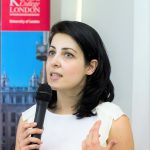Dr Diana Bozhilova, Teaching Fellow Summer Programmes, brings her lively discussions on the theory and practice of International Relations to our London programmes through her annual contribution to the King’s Summer School Programmes.
Political events “crowd” our lives with increasing dynamism. This leads to greater interest in the study of International Relations (IR) as a means to explaining ethical questions, consequentialist and deontological reasoning. As a result, normative IR is still very relevant but how do we teach it within short courses for highly mobile and technologically astute young audiences for whom time is of the essence?
Core concepts
My experience of teaching IR has been one of focusing on core concepts and methods. Short courses allow for selecting “relevant” blocks on which to scope attention in order to critically appraise a particularly impactful development in international relations. Take Brexit, Russia or China for example – separately, they challenge aspects of the liberal international order established during the “American” century and contribute to the sense that something rather big is afoot. For normative IR, this means a conceptual and methodological shift being under way.
Roadmaps
The learning outcomes for short courses in IR centre on developing critical thinking and analytical capacities that enable students to transform information flows into knowledge. I would never forget how on one of my travels to India and whilst occupied with thoughts about the impact of technology on the study of IR, a friend from Mumbai remarked: “Google cannot help find your slippers in the temple.” Technology is an information enabler but normative IR provides roadmaps that transform data flows into meaningful building blocks.
Application
Games and simulations increasingly infiltrate IR pedagogy. On the one hand, those opposed to such dynamic teaching models emphasise their inevitably reductionist approach to understanding normative IR through diminution of variables, thus confining discussions to basics at the expense of the vastness of paradigms and approaches that exist in the discipline. On the other hand, their great utility lies in adapting static theories to dynamic teaching models. This has a particular advantage for international audiences who would like to see how theories apply within different geographic and institutional settings. Simulations can involve structural constructs from diplomacy and negotiations, economic development and governance reforms, management of warfare and environmental crises. They are well suited to short courses, dedicated sessions, and blended learning models.


